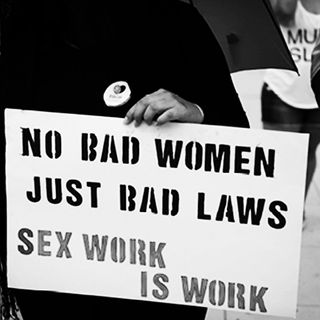In Dream Girl, we see a typical, caricaturized ‘angry feminist,’ Roma, played by Nidhi Bisht: she has had three break-ups, as a result of which she has violent thoughts about all men and is hated by her male subordinates. Enter Ayushman Khurrana, who plays Karamveer Singh, who masquerades as Pooja — a ‘friendship call center’ employee who talks to lonely, horny people (mostly men) in an affected woman’s voice to provide comfort and companionship. When the ‘angry feminist’ calls in, Pooja takes Roma’s exaggerated anti-men rhetoric to heart and tells her #notallmen are bad, that girls are equally capable of betrayal — a common deflection used by men in society when feminists bring up gender issues. With Pooja’s sexy voice whispering sweet nothings into her ear, Roma suddenly mellows down, starts distributing roses to her employees, and begins to fancy the disembodied voice in a sudden change of sexual orientation.
This is a common theme in Dream Girl — manipulation by the protagonist. By day, Khurrana’s character’s male avatar, Singh is busy giving up his seat to a woman on the bus, taking the stage at a stranger’s funeral to proclaim women should be allowed to go to burial sites or declaring to everyone he meets that he isn’t afraid to sound like a woman (whatever that means). At night, he adopts an avatar of the caring, attentive, sultry-voiced Pooja — mostly to men who feel entitled to female attention.
Related on The Swaddle:
The Men Helping Other Men Challenge Toxic Masculinity
One of Singh-as-Pooja’s clients is a drunkard poet/policeman, played by Vijay Raaz, whose wife is shown as another angry woman who stands up for herself and doesn’t care for her husband. Lonely, Raaz calls Pooja’s line and ultimately falls in love with her. Throughout the film, Pooja’s implied sensitivity combats the loneliness of unloved, problematic men — all they need is a woman to be nice to them, because the women in their lives are too busy being modern feminists to pay attention.
It’s not just the clients Singh manipulates as Pooja — all the women in Dream Girl exist to either be enchanted or manipulated by Khurrana’s Singh. His public declarations of equal rights get him an in with the film’s love interest, Dolly, played by Nushrat Bharucha.This happens even as he attempts to speak to her by following her around (and never acknowledges as what it really is: stalking).
Every time we see a woman in the film behaving in a way filmmakers must think is modern and feminist — be it drinking, standing up for herself, or unapologetically taking up space — Singh is present, to manipulate them into making his now double-agent life easier (such as when he lies to Raaz’s wife, convinces her to get dolled up for her husband, urges her to ‘smile’ and talk to her husband with love, so he could be rid of Raaz’s incessant phone calls); to give them a lesson in the ethics of equality (such as when Khurrana’s Singh mansplains to Roma that alcohol and cigarettes are examples of a bad habit, not a sign of bad character); or to save them (such as when Dolly slaps Singh’s insolent boss across the face, and when the boss attempts to retaliate, Singh, in typical Haryana fashion, blocks the hit, adding “Pooja mard hai” (Pooja is a man).
By the end, Dream Girl views as a tired, boring dude-fest with all the trappings of performative feminism. Its dialogues about feminism seem to be picked at random from feminist Twitter; its protagonist seems to have been designed to allay the egos of all the men whose claims to goodness seek to render women’s voices unheard; its script seems too superficial, unfunny, and replete with toxic incel rhetoric that filmmakers blame on the isolation incited by social media.
Please, Bollywood, if you decide to challenge the complicated subjects of toxic masculinity and feminism in a film — let it have well-thought-out women characters, let it go through a gender sensitivity check, and most of all — let there not be a male savior.




